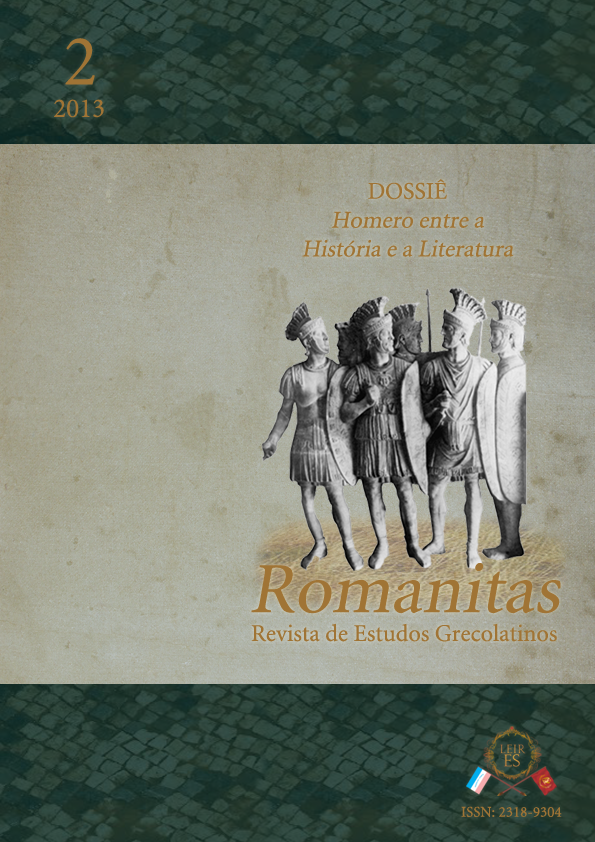Identidade heroica e identidade da multidão na 'Ilíada'
DOI:
https://doi.org/10.17648/rom.v0i2.7414Palavras-chave:
Ilíada, História das Multidões, Identidades, Sociedade HoméricaResumo
Na Ilíada, a multidão exerce um papel fundamental para a construção da trama. Ela ajuda a ambientar a epopeia em um cenário de guerra épica, além de ser necessária na própria definição daqueles que são as figuras centrais do poema: os heróis. Nesse sentido, procurou-se discutir justamente a função da multidão, massa, ou coletividade, em um poema em que o enfoque recai em outro elemento. Para tal, foi preciso estabelecer a forma com que ela garante que o herói seja mostrado de maneira épica. Utilizando o conceito de identidades, este artigo procura definir a maneira como estes dois elementos interagem na Ilíada. Conclui-se que a multidão ambienta e define a ação do herói, sendo um elemento essencial para a compreensão do poema homérico.Downloads
Referências
Documentação primária impressa
HOMERO. Ilíada. Tradução de Frederico Lourenço. Lisboa: Cotovia, 2005.
HOMER. Ilias. Translation of M. L. West. Stuttgart & Leipzig: Bibliotheca Teubneriana, 1998. v. I.
HOMER. Ilias. Translation of M. L. West. München & Leipzig: Bibliotheca Teubneriana, 2000. v. II
Obras de apoio
ADKINS, A. W. H. Merit and responsibility: a study in Greek values. Chicago: University of Chicago Press, 1975.
BARTH, F. Grupos étnicos e suas fronteiras. In: POUTIGNAT, P.; STREIFF FERNART, J. Teorias da etnicidade. São Paulo Unesp, 1998, p. 187 227.
CANETTI, E. Massa e poder. São Paulo: Companhia das Letras, 1995.
CUCHE, D. A noção de cultura nas ciências sociais. Bauru: Edusc, 2002.
CUNLIFFE, R. J. A lexicon of the Homeric dialect. University of Oklahoma Press, 1988.
DONLAN, W. The aristocratic ideal and selected papers. Wauconda: Bolchazy Carducci, 1999.
DUBAR, C. A crise das identidades: a interpretação de uma mutação. São Paulo: Edusp, 2008.
FINKELBERG, M. Patterns of Human Error in Homer. The Journal of Hellenic Studies, v. 115, p. 15-28, 1995.
FINLEY, M. I. The World of Odysseus. Londres: Penguin, 1991.
HALL, S. Quem precisa da identidade? In: SILVA, T. T. da. Identidade e diferença. Petrópolis: Vozes, 2000, p. 103-133.
OLIVEIRA, G. J. D. A Interação entre herói e multidão na Ilíada. Mare nostrum: História e integração no Mediterrâneo Antigo, v. 1, p. 57-70, 2010a.
OLIVEIRA, G. J. D. Unidade da multidão e da massa na Ilíada. Alethéia, v. 2, p. 1-17, 2010b.
OLIVEIRA, G. J. D. Aspectos formais e sensoriais da coletividade, massa e multidão na Ilíada. Notícia Bibliográfica e Histórica (Puccamp), v. 206, p. 7-23, 2009.
RUDÉ, G. A multidão na História: estudos dos movimentos populares na França e na Inglaterra 1730-1848. Rio de Janeiro: Campus, 1991.
SILVA, T. T. da. Identidade e diferença. Petrópolis: Vozes, 2000.
STAGAKIS, G. Therapontes and hetairoi, in the Iliad, as symbols of the political structure of the Homeric State. Historia: Zeitschrift für Alte Geschichte, v. 15, n. 4, p. 408-419, 1966.
WOODWARD, K. Identidade e diferença: uma introdução teórica e conceitual. In: SILVA, T. T. da. Identidade e diferença. Petrópolis: Vozes, 2000, p. 7-72.
Downloads
Publicado
Como Citar
Edição
Seção
Licença
Copyright (c) 2014 Romanitas - Revista de Estudos Grecolatinos

Este trabalho está licenciado sob uma licença Creative Commons Attribution-NonCommercial-NoDerivatives 4.0 International License.
a. Os autores mantêm os direitos autorais e concedem à revista o direito de primeira publicação.
b. Os autores têm autorização para assumir contratos adicionais separadamente, para distribuição não-exclusiva da versão do trabalho publicada nesta revista (ex.: publicar em repositório institucional ou como capítulo de livro), com reconhecimento de autoria e publicação inicial nesta revista.
c. Autores têm permissão e são estimulados a publicar e distribuir seu trabalho online (ex.: em repositórios institucionais ou na sua página pessoal) após a primeira publicação pela revista, com os devidos créditos.
d. Os textos da revista estão licenciados com uma Licença CC BY 4.0 Deed Atribuição 4.0 Internacional (CC BY).




























